 I’m drawn to post-apocalyptic themed games like no others. If I had to guess why, it must have been all the post-apocalyptic movies, books, and games that I grew up with in the 80s. But no matter what has influenced me, I don’t want a post-apocalyptic future of any kind. I love my wi-fi, cold beverages, and indoor plumbing too much. So, I guess I really like visiting an imaginary post-apocalyptic world on game night and desire nothing beyond that.
I’m drawn to post-apocalyptic themed games like no others. If I had to guess why, it must have been all the post-apocalyptic movies, books, and games that I grew up with in the 80s. But no matter what has influenced me, I don’t want a post-apocalyptic future of any kind. I love my wi-fi, cold beverages, and indoor plumbing too much. So, I guess I really like visiting an imaginary post-apocalyptic world on game night and desire nothing beyond that.
This brings us to Ruination from Kolossal Games. This area control, dudes on a map game submerges players into a post-apocalyptic Eurasia setting where they control a horde. Players will scavenge, battle, and improve their horde while vying to become the ruling Khan’s chosen ally by gaining the most VPs.
Ruination is for 2-4 players, lasts between 60-120 minutes and plays best with 2 or 4 players.
Game Overview:
The game set-up and play will be the same for each player—the only difference is that players will choose 1 of the 4 horde boards which have identical basic sides and have a unique special ability on the advanced side.
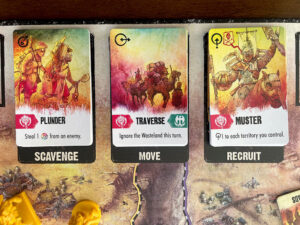
After setup, Ruination is played in the following steps.
- Choose and resolve action card: Players will choose from either the Scavenge, Move, or Recruit deck and resolve the card’s action.
• Scavenge: Gain resources and possibly purchase 1 advantage card using their resources to improve their horde.
• Move: Move units around the board, possibly initiating a battle.
• Recruit: A player gains 3 recruit points to add units to the board. Grunts cost 1, a Raider costs 2, and a Brute costs 2. - Resolve Battles: Battles will occur when players have their units in a shared territory. Both sides determine strength from their unit’s starting stats, bonuses from any cards, battle dice, and battle actions that can activate on the player’s horde board for additional bonuses as well. The winner is the player with the highest strength total. Casualties are then determined and applied to each side and the loser retreats to an adjacent territory, either empty or one they already control.
- Check Army Limits: After all battles have been resolved, players check that each territory contains a maximum of 6 units.
End Game: End game is triggered after the Khan’s Fury is initiated and that happens in the following ways:
• a player reaches or exceeds the 10th space on the favor and/or glory track
• a player reaches or exceeds 30 VPs
• a player draws the last card of the 3 action card decks
Players then score 2 VPs for each Bastion and the current round is finished. All players will take a final turn and then end game scoring occurs. The player with the highest VP wins and rules alongside the Khan. The rest of the players are slaughtered.
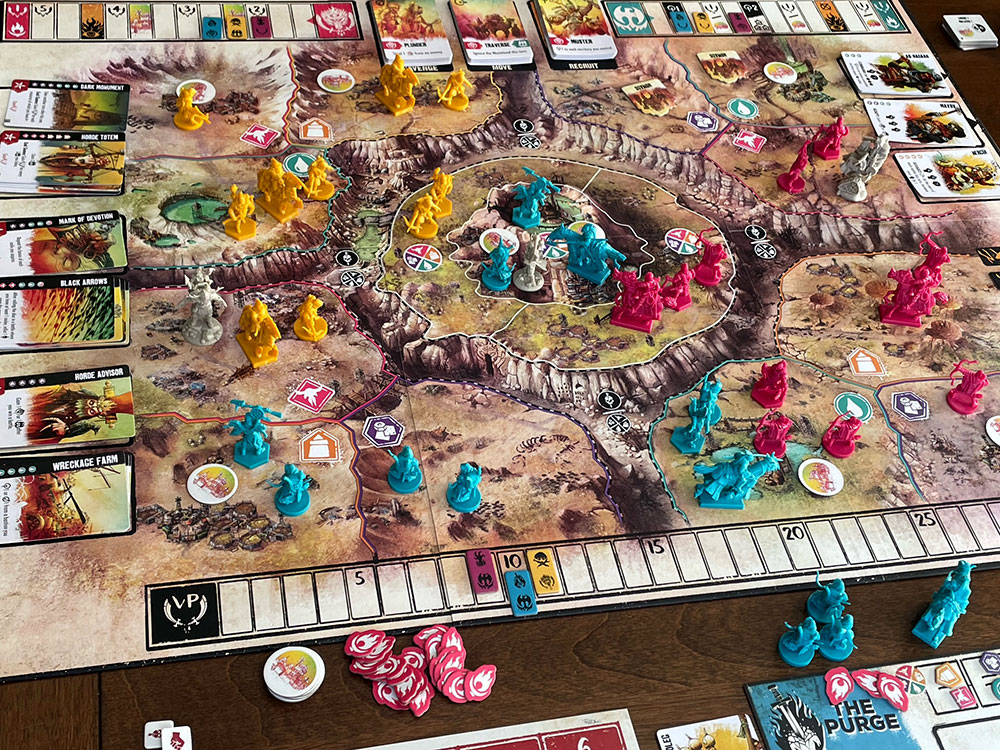
Game Experience:
I had hoped my love for post-apocalyptic games would continue with Ruination and I was not disappointed. First, the theme is on the unique side given that it takes place in Eurasia, and you can see those cultures well represented. Most post-apocalyptic games I own and have played are usually based in the US or Australia, so this is a nice change of pace. The post-apocalyptic theme is well supported in all aspects of Ruination, from the illustrations on the map, all card decks, figs, and rulebook. I really love how even the Ruination gameplay is combat-focused, which is what you’d expect from rival post-apocalyptic Hordes vying for Khan’s favor.
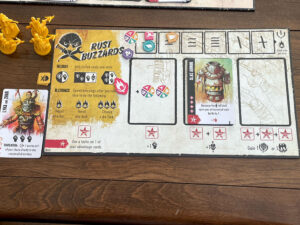
Another plus for me was the action card decks that give great options and some cards have additional powers you can use when you are scavenging, moving, or recruiting. Most turns, especially early in the game, will go very fast and you might have a set idea of what action type you want to select. But having three decks to choose from with additional abilities could have you changing your mind. Especially given where your or your opponents’ armies are. Having these options gives players a good sense of control and not feel that they are always locked into an action that doesn’t have value.
The last thing that I really liked about Ruination is the game board. As I mentioned this is a dudes on the map combat-focused game. So, it’s important to have plenty of options where to take your Horde’s armies and battle with opponents or Nomads. The Ruination Map has five spaces on it that require more than one space to move to—the remaining 10 spaces can be reached with one movement. Now, most of that movement will likely have you enter the wasteland which requires you to pay one resource or take one casualty to move through it. But the wasteland is vast and allows you to move to most spaces that can give you the best options for battles or securing a Bastion.
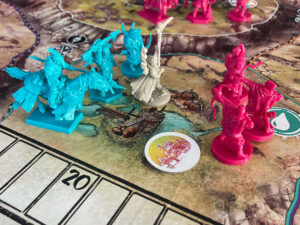
So, as outlined in the overview, battles are based on a mix of combat dice, advantages, and battle actions on your Horde board. All that made sense and was fun, but I didn’t understand or like that you received battle dice based on the different units in your army. So, if you have grunt, raider, and brute, you gain three dice but if you had three grunts, you’d only receive one die. Battle dice are a key element in battles and can decide a victory, and I thought this was a weird rule that didn’t make sense to me.
Another aspect of Ruination that I had an issue with was the Exiles. While I like the concept of these units, they seemed to be over-powered. In our first three games, whoever was able to purchase and deploy an Exile first usually jumped out to an early lead. Exiles in my opinion were overpowered for a few reasons. First, an Exile is a different unit that adds +1 action dice to battles. Second, they all have bonuses that will grant more strength, and even more than +1 battle dice. Lastly, most Exiles also have additional abilities that key off actions or when deployed. Now, Exiles are not cheap so you’re paying significant resources to acquire them, but they seem to be a real difference-maker in battles and gaining territories and VP especially early in the game.
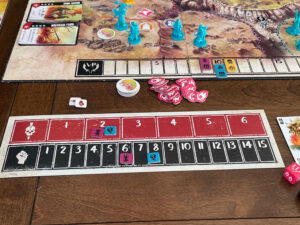
As I mentioned above most of your turns will go very quick and this keeps the game going at a good pace for all players involved. But when your armies go and then clash with similar size forces this, unfortunately, can bog the game down and can lessen player engagement particularly for those not involved in the battle. I will say the first big battle will usually have all players interested in the outcome but after that, it’s not surprising for other players just to see what the final outcome is and not get caught up determining a winner or casualties. Bigger battles slow the turns mainly because you’re tallying strength, determining battle dice, and then deciding what advantages apply, and then as you roll, you’re trying to activate battle actions and additional advantage powers.
Final Thoughts:
I do want to credit Kolossal Games for making a well-supported and themed post-apocalyptic game set in Eurasia. The action cards and game board for Ruination give players plenty of options and control to a game where you will be constantly battling with your opponent’s armies.
There are a few elements that held back Ruination from scoring higher for me like a strange rule for how battle dice are determined, over-powered Exiles, and large battles slowing the pace of the game. These elements are not all deal-breakers for me to play Ruination but might hurt just how many times it will hit the table.
Final Score: 3.5 Stars – A fun dudes on a map post-apocalyptic area control game that focuses on combat and trying to gain the most VP.
 Hits:
Hits:
• Well-supported theme
• Action decks
• Game board
Misses:
• Battle dice determined by unit variety
• Exiles seem overpowered
• Bigger battles slow play





















